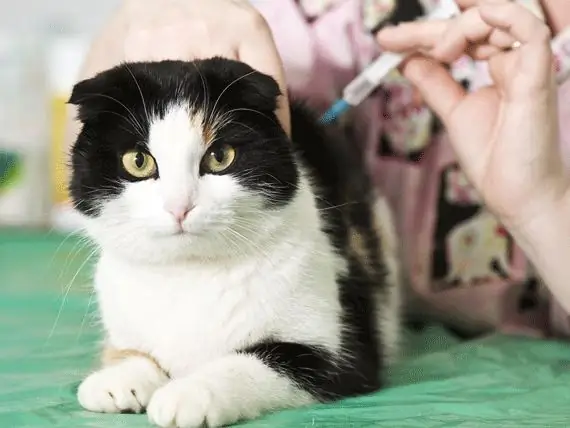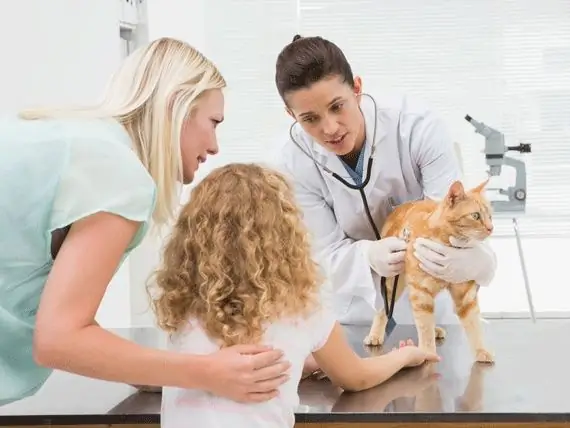
- Avtor Daisy Haig haig@petsoundness.com.
- Public 2023-12-17 03:13.
- Nazadnje spremenjeno 2025-06-01 06:48.
Torej, čemu sploh služi ta sramotni test caca?
Dovolj stresno je, da hrbtu vašega ljubljenčka krši plastična palica, kajne? Torej, v čem je smisel?
Pravite: Če je cilj mojega ljubljenčka narediti bolj zdravega in brez parazitov, bom zaupal vaši presoji, vendar moram reči, da so pregledi blata nekakšna kruta in nenavadna kazen. Takšnega ponižanja ne dobim, dokler nisem moški in dopolnem štirideset let, kajne? In fekali niso tako koristni, kajne?
Pravim: Za začetek vam ni treba, da bi vaš ljubljenček podlegel podli palici. Svež vzorec je običajno enostavno dobiti zjutraj (ali popoldne) pred vašim letnim obiskom ali kadar koli vaš ljubljenček trpi zaradi prebavil. V resnici ni tako težko. In če čas ni ravno pravi (blato ne sme biti starejše od ene ure za najboljše rezultate), vam veterinarska bolnišnica zagotovo ne bo odrekla pravice, da vam vroči super svež vzorec. Obljubi.
In ja, fekalni pregledi, čeprav so razmeroma poceni in rutinski, so nepogrešljivi. A kot bo razvidno iz tega prispevka, je tudi res, da vsi fekalni testi ne bodo odkrili okužbe s paraziti pri vaših hišnih ljubljenčkih. Zato so morda potrebni letni in / ali serijski fekalni pregledi.
Zdaj pa glavni cilj testa:
Veterinarji so vedno pozorni na parazite, ki se lahko znajdejo v prebavilih vaših ljubljenčkov. Seveda tudi ljudje lahko dobimo zajedavce, toda naš sodobni življenjski slog je običajno manj ugoden za okužbo s paraziti. (Kdaj ste se nazadnje zadihali na dvorišču, z ustnicami do tal, samo zato, da ste lahko vdihnili mačjo kašo ali dve?)
Da, hišni ljubljenčki dobijo veliko parazitov. Tu je vzorec najpogostejših parazitov v prebavilih, ki jih vidim tukaj [v nebesih parazitov, ki je poltropska južna Florida]:
Okrogli črvi pri psih in mačkah.
Hokiworms pri hišnih ljubljenčkih
Whipworms pri hišnih ljubljenčkih
Giardia pri hišnih ljubljenčkih

Jetrne mehurje pri hišnih ljubljenčkih
Jetrne mehurje pri hišnih ljubljenčkih
coccidia in pets
i’ll not go into the gory details on each but you can click on the links and check out the info for a better understanding of how these parasites can potentially affect your pets and even your human family.
sure, pet-popular parasites don’t often infect humans in the so-called, “developed” nations all of you reading this likely live in, but that doesn’t mean it doesn’t happen. roundworms and hookworms are still a factor in humans in the us, as is giardia, which will give you the nastiest case of diarrhea you can imagine short of amoebic dysentery.
since veterinarians are also on the front lines when it comes to public health, consider that fecal exams are not just necessary for healthy pets, they’re essential for healthy humans, too, more so if your family members are very young children, very old adults or otherwise immunocompromised (transplant patients, hiv-positive humans, chemo recipients, etc.).
how do we identify these critters in the fecal exam?
the short answer: with a microscope.
the long answer: we take a tiny sample of your pet’s stool (very fresh is always best). a few grams is enough (think an eighth of a teaspoon if that’s easier). then we put it through one of three processes.
1. the smear: we take about a half gram of stool and smear it onto a microscope slide to search for parasites (and bacteria) directly. many times we’ll see them swimming about. finding evidence of parasites in a simple smear is often indicative of severe infection.
2. the float: this method relies on mixing the stool with a special solution. it filters out the big pieces of stool in a tube or other cylindrical vessel and allows the eggs and other small critters to float up to the top, buoyed by the solution’s specific gravity. a microscope slide’s cover slip is typically used to recover the floaters. some parasites, however, aren’t amenable to flotation. eggs seem to do best through this method.
3. centrifugation: spinning the heck out of stool in a centrifuge when it’s mixed in a sugar solution picks up about 50% more parasite eggs and oocysts than through flotation. therefore, i like this method best for worm eggs, giardia, and coccidia--though i’d never go without a smear. problem is, most hospitals don’t yet use this method. it’s more expensive than others and research demonstrating it’s much greater efficacy is fairly recent.
so now you know the truth: not all fecal exams are created equal. not only does this test rely on careful selection of materials and methods, it also requires a trained eye. in our practice, for example, one of our techs detects parasites about 50% more often than the veterinarians and other techs/assistants. (that’s why we also do floats so that she can check them all at her convenience when she comes back from her day off.)
it’s also true that even a parasite-infected animal will often not come up positive on a fecal test. human error and equipment choice are factors, but so is the parasite itself. sometimes they do not make themselves known in the stool. worms sometimes aren’t shedding their eggs and subclinical (low-grade or smoldering) infections may not reveal much, either.
again, that’s why it’s important to perform this test as often as is reasonable. for all dogs and cats at least three times during the first few months of life. i want to see at least two negative tests in a row, a month apart, before i’ll feel comfortable that my patient is parasite-free.
for adults, once a year is great--that is, unless they show gastrointestinal illnesses. in this case, serial fecal tests make sense--or at least one every time the symptoms recur until a definitive diagnosis is made (whether it’s parasites or something else).
ultimately, fecal tests are a critical component of our veterinary hat of tricks. doing without may seem like the economically wisest thing in the absence of gastrointestinal symptoms, but consider: parasites can wear pets down in ways you might not expect. and it’s never wrong to be too safe in the presence of diseases that may also affect your family. ‘nuff said.
Priporočena:
Kaj Urin Vašega Ljubljenčka Pravi O Njegovem Zdravju

Urin je pri hišnih ljubljenčkih zelo dragocen pokazatelj zdravja. Preberite več o značilnostih urina vašega ljubljenčka in kdaj spremembe vonja ali barve lahko kažejo na težavo
Kaj Je Titer Test In Ali Je Primeren Za Vašega Ljubljenčka?

Da bi preprečili naraščajočo zaskrbljenost javnosti in odpravili dokaze, da lahko nekatera cepiva negativno vplivajo na nekatere hišne ljubljenčke, je eden od medicinskih postopkov, s katerim se ugotovi potreba po cepljenju, titrski test. Več o tem lahko preberete tukaj
Kaj Bloodwork Pove Vašemu Veterinarju O Zdravju Vašega Ljubljenčka

Krvno preiskava se izvaja, da se zagotovi, da smo znotraj tako zdravi, kot se zdi zunaj, ali za spremljanje predhodno diagnosticiranih zdravstvenih stanj. Enako velja za živali spremljevalke. Preberite več o tem, kaj lahko krvna slika pove vašemu veterinarju
Kaj Morate Vprašati Svojega Veterinarja O Raku Vašega Ljubljenčka

Lastniki sprašujejo ogromno vprašanj o raku svojih hišnih ljubljenčkov. Nekateri so predvidljivi, nekateri pa bolj specifični, drugi pa so lahko izjemno preizkusni. Preberite več o tem, kaj bi morali vprašati svojega veterinarja
Kako Vedeti, Ali Vaš Hišni Ljubljenček Potrebuje Obdukcijo (in Kaj Sploh Je Obdukcija?)

Obdukcija, avtopsija živali, hišni ljubljenčki, pes, mačka
